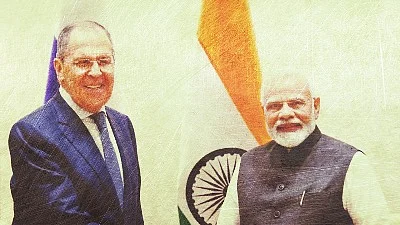The primary reason for Russian Foreign Minister Sergey Lavrov’s visit was by way of thanking India for its Russia-leaning neutrality on the Ukraine issue and for shoring up support from a country that has come under a great deal of pressure in recent days to modify its stand on the matter of the Russian invasion of Ukraine.
The visit was also to show to the world that far from being isolated, Russia has powerful friends around the world, which include China and India. Countries like Brazil and South Africa, too, have not indicated that they see things the same way on the Ukraine issue as the west does.
India Caught Between Russia's Actions Versus & West's Perceptions
The west is putting across this conflict as a contest between authoritarianism and democracy. But many of the holdouts do not see things in the same way. They recall the double standards that the west has employed on such issues. As it is, OPEC nations have stood by Russia, rather than go along with US suggestions that they increase their production.
New Delhi may have called for a cessation of hostilities and resolution of the problem through dialogue, but it has deflected the central issue of Russia’s invasion of Ukraine, a member of the United Nations.
A press note issued by the Ministry of External Affairs noted that Minister S Jaishankar had “emphasised the importance of cessation of violence and ending hostilities.” Adding “Differences and disputes should be resolved through dialogue and diplomacy and by respect for international law, UN Charter, sovereignty and territorial integrity of states”.
This last sentence sums up the problem: Russian actions are not respecting the international law, UN charter or the territorial integrity of Ukraine. And, for the record, nowhere does the charter give room for countries to launch “special military operations” against other countries without the express consent of the UN Security Council.
What Lavrov Said and Implied in New Delhi
Lavrov disclosed in a media briefing after meeting Jaishankar that while Russia would be open to Indian mediation on the issue, but he had not heard of any such proposal. In other words, New Delhi seems content to articulate its somewhat complicated position on the issue without even a pretense of trying to do something about one of the gravest crises confronting global politics, one that has implications for its own well-being.
Speaking after his meeting with his Indian counterpart, Lavrov praised India for viewing the Ukraine crisis in the “entirety of facts and not just in a one-sided way”. He also outlined the Russian intention of increasing its use of non-Western currencies for trade with countries like India. He said that the Russian central bank had, for some time, established a system for communicating financial information, while India had its own system. Now, the two would use the rupee-rouble mechanism to trade oil, military hardware and other commodities.
He also disclosed that the forward movement in negotiations with Ukraine for a “non-nuclear, non-bloc, neutral status.”
The Russian foreign minister also spoke of the Russian interest in strengthening ties with India because of its desire to promote a “balanced world order.” He said the two countries would continue to work on projects in the areas of space, energy and Science and Technology, adding that Russia would be ready to “supply to India any goods which they want to buy.” Earlier, in China, he had noted that countries like Russia, China and India could move towards a genuinely multipolar, just, democratic world order”.
How the US Views India-Russia Relations
While there is a degree of understanding in Washington about India’s compulsions, especially in relation to defence equipment, the somewhat defiant language coming out of New Delhi may not be a good sign. Finance Minister Nirmala Sitharaman told a TV channel that she would put her country’s national interest energy security first, “Why should I not buy it ?” she asked, “I need it for my people”.
Besides contracting for oil, India is also buying sunflower oil from Russia.
Visiting Deputy National Security Adviser of the US Daleep Singh put it this way—there was no “red line” for New Delhi, but Washington did not want to see a rapid scaling up of the purchases.
In other words, it was one thing for India to deal with Russia as a matter of necessity, but quite another to exploit the situation for its own benefit. Or to use another phrase, abstention in the UN is one thing, but abetment through assisting the Russians to avoid sanctions quite another. The US would not tolerate a situation where New Delhi actively undercuts Washington’s efforts to isolate Moscow.
India Walks on Difficult Road Ahead
The message is that India should not forget that its principal foreign policy goal is the transformation of the lives of hundreds of millions of its people through sustained economic growth. In this endeavor, it should not forget that the principal source of the capital and technology it would need would come from the US, EU and Japan which would also be the principal market for the goods it wishes to sell.
With the initial impact of the western sanctions having eased off, principally because the Russians seemed to have anticipated them, the western bloc will now further tighten the screws and seek to block efforts to circumvent sanctions. India which has gotten off easily because Washington sees its importance as part of its Indo-Pacific strategy, may now find the going tough.
(The writer is a Distinguished Fellow, Observer Research Foundation, New Delhi. This is an opinion article and the views expressed are the author's own. The Quint neither endorses nor is responsible for them.)
(At The Quint, we question everything. Play an active role in shaping our journalism by becoming a member today.)
